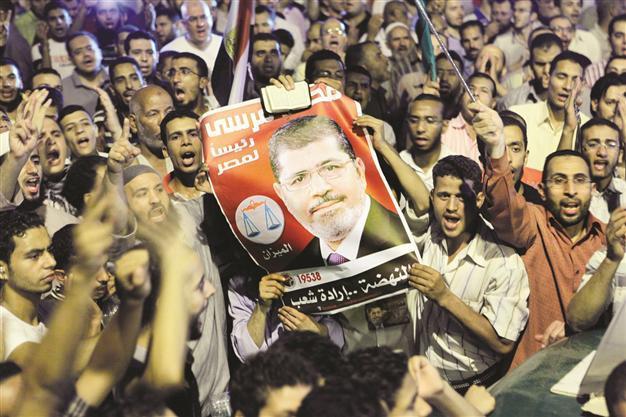Brotherhood puts stamp on crucial state positions
CAIRO

Egyptian President Morsi moves to reshape state institutions that were long the monopoly of an ousted leader and the military with installing Islamists to key positions. AP photo
Egypt’s President Mohamed Morsi took a new move to put its stamp on the country’s government, appointing members of the Muslim Brotherhood as provincial governors and installing ultraconservatives and other Islamists in the state’s top human rights body and a powerful media council.The shake-up was the latest step by Morsi and his Muslim Brotherhood to reshape state institutions that were long the monopoly of ousted autocrat Hosni Mubarak.
Morsi’s office announced 10 new governors. Four of the new names are leading members of the Brotherhood, taking the posts in the southern provinces of Minya and Assiout, two areas with heavy Christian populations, and the Nile Delta provinces of Kafr el-Sheikh and Menoufia, a stronghold of former regime supporters. In a gesture to Egypt’s still powerful military, three of the new governors are retired generals, according to the Associated Press. “The governors were chosen on the basis of efficiency, the ability to connect with the people, good reputation and not party affiliation,” presidential spokesman Yasser Ali said yesterday in a statement. Supporters have praised the moves as part of a drive to cleanse the system of Mubarak loyalists after Morsi was inaugurated in late June. But the heavy infusion of Islamists into government institutions has raised fears of Brotherhood domination monopolizing power as much as Mubarak did and moving Egypt into a more religious rule. Another significant shakeup came in the National Council for Human Rights.
The new 27-member council includes at least seven Islamists, including several members of the ultraconservative Salafi movement, which advocates a strict, segregationist interpretation of Islam similar to Saudi Arabia’s. The Shura Council also reshuffled the High Press Council, a state-body in charge of overseeing media regulations, introducing several Islamist politicians as members.
















